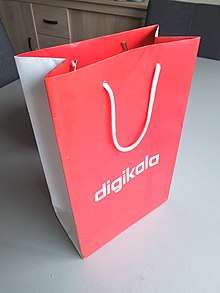Digikala
Digikala (Persian: دیجی کالا), is an Iranian e-commerce company based in Tehran. It was founded in July, 2006 by twin brothers Hamid and Saeid Mohammadi who had an unpleasant experience when they tried to buy a digital camera, after which they used $10,000 of their own savings to start the company.[1][2] The company was reported to be valued at $150 million in 2014, and $500 million in late 2015.[3][4] One of its investors is Russian billionaire Vladimir Potanin, although Digikala's main investor is Sarava Pars, an Iranian investment company.[5] Digikala offers same day delivery in Tehran and Karaj, and offers next day delivery in 20 other cities.[6]
| Private company | |
| Industry | E-commerce |
| Founded | July 1, 2006 |
| Founders | Hamid Mohammadi Saeid Mohammadi |
| Headquarters | , |
Number of employees | 4550 (2020) |
| Subsidiaries | www www |
| Website | www |
Growth

Digikala is one of the Iranian startups that benefit from the country's increasing digitization. By 2017, 62% of Iran's households have been connected to the Internet and this development is driving demand for Internet services that mirror Western digital platforms such as Amazon.[7] Digikala is ranked by Alexa as Iran's 3rd most visited website.[8] It is also the largest e-commerce platform in the Middle East.[9] It has 1,700,000[10] unique visitors per day, and 85% of Iran's ecommerce now takes place on Digikala.[11] The company does not publicise its revenue but has said sales are growing at a rate of 200% a year, and that it is receiving orders from even the most remote villages in Iran. Hamid Mohammadi said the main focus of the company remains expansion "even if that means we will not be profitable, which is how Amazon is operating”.[12]
Iran's economic volatility forced Digikala to lay off 175 workers in 2018.[13] To survive, it adopted several initiatives such as the pay-per-sale strategy which allow users - as affiliates - to receive commission if a directed customer purchased a product.[14] In March 2019, Digikala also addressed the issue authenticity of products in the platform after receiving complaints over the quality of goods being sold. In a statement, it stated that only 0.2% of the 2 million products are unoriginal and that the company has taken steps to implement stringent quality control.[15]
References
- "REUTERS SUMMIT-'Iran's Amazon' disregards post-sanctions competition, looks to expand".
- "Forbes: Meet The Twin Brothers Transforming How Iranians Shop".
- "The Washington Post: Here's what it's like to launch a start-up in Iran".
- "BBC: Iran's digital start-ups signal changing times".
- "RussiaToday: First Russian billionaire investing in Iran after sanctions".
- "The Washington Post:What the Iran deal means for the country's surprisingly strong tech industry".
- "Iranian Startups Offer Opportunities In An Unstable Economy". RFE/RL. Retrieved 2019-05-09.
- "Alexa: Top Sites in Iran".
- Dehghan, Saeid Kamali (2015-05-31). "From Digikala to Hamijoo: the Iranian startup revolution, phase two". The Guardian. ISSN 0261-3077. Retrieved 2019-05-09.
- "دیجیکالا بزرگترین مرکز پردازش سفارش در خاورمیانه را راهاندازی کرد".
- "The Guardian: From Digikala to Hamijoo: the Iranian startup revolution, phase two".
- "FT:Iranian ecommerce thrives despite obstacles".
- "In Face of Hard Times Iran's Digikala Remains Upbeat". Financial Tribune. 2018-09-07. Retrieved 2019-05-09.
- "Digikala Enlists Pay-Per-Sale Strategy". Financial Tribune. 2018-09-21. Retrieved 2019-05-09.
- "Digikala to Carry Out Stringent Quality Control". Financial Tribune. 2019-03-12. Retrieved 2019-05-09.